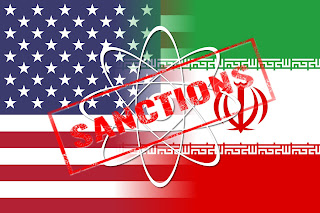Soleimani Killing: Its Affect on the Gulf Region
Where is the Middle East Headed
After the Killing of Solemani
Tonight I attended an event sponsored by the Al Jazeera Center for Studies focused on the topic: "Where is the Middle East Headed After the Killing of Solemani."
The program -- held on January 8, 2020 at the Al Jazeera Media Institute Auditorium -- featured four speakers:
- Mahommaed Cherkaoui, Senior Researcher at Al Jazeera Centre for Studies.
- Liqaa Maki, Senior Researcher at Al Jazeera Centre for Studies.
- Haoues Taquia, Researcher at Al Jazeera Centre for Studies.
- Majoob Zweiri, Director of the Gulf Studies Center at Qatar University.
The translation services were again disappointing because of a variety of technical issues. Half the audience left after 30 minutes. I stuck around for intermittent translation services and the chance to talk with people at the reception afterwards. Accordingly, my notes are very incomplete. So, any summary here is given with a very big caveat.
The speakers made the following statements:
1. The U.S. will never have the power it seeks in the region because it will not commit the necessary number of troops to the task, and it repeatedly undercuts its relationships with regional allies. Those allies can cultivate other alliances that are potentially hostile to the US, like relationships with Russia or China.
2. The killing of Soleimani (US spelling) was an abuse of power -- a bullying act by Trump.
3. Depending on the US response to the attack on the military base in Iraq in the last 48 hours, the parties can return to the status quo ante with ongoing conflicts carried out by regional proxies.
4. War is not likely.
5. Iran is not likely to attack any countries not directly involved in the dispute, including UAE and Israel, despite its recent threat.
6. Gulf countries will try to play the role of the mediator. One speaker recommended that one country issue the invitation for dialogue and host the mediation, as Qatar has done between the Taliban and the US.
7. Iran may want to return to the negotiating table, but on its own terms.
8. Iran will have difficulty filling the vacuum left by Soleimani and will need to modify its foreign policy as a result.
9. Soleimani's killing is the equivalent of 9/11 for Iran. It brings out the same patriotism and emotional reaction.
10. Popular protests in Iraq have weakened the political power of Iran-backed militias there. About 140,000 people have participated in them.
11. Iran wants US forces out of Iraq, but cannot push them out on its own. Similarly, the US cannot push out Iran from Iraq, even if it wants the Iranian influence out of Iraq.
12. The killing has changed the rules of the game for both countries. Iran now has the sense it can kill a top US governmental official in retaliation. It is no longer the sole power exercising Nixon-like "mad man" actions.
13. On the other hand, the killing did not change the rules of the game. Both countries seek to establish a balance of power by engendering fear without direct confrontation.
14. The US is no longer a major power in the region since 9/11. It's response to that event robbed it of its prestige.
15. The increased activity of Turkey and Iran have changed the balance of power in the region.
16. Soleiman did not take sufficient security precautions because he thought a gentleman's agreement existed between Iran and the US that protected him.
17. The situation in the Gulf countries changed when Iraq invaded Kuwait. The situation in the Gulf countries will remain largely the same, but the countries need to think outside the box strategically and about security. They should develop a new security architecture.
18. Each Gulf country must assess its national security capabilities with great clarity. If that country has a weak national security capability, then it should not make Iran an enemy.
19. Gulf countries are moving around two axes: (1) Saudi Arabia/UAE, and (2) Iran/Turkey. It creates a dangerous regional environment.
20. The upcoming US election will force Trump to continue to shift the focus from domestic issues, including impeachment, to external issues.
For an Arabic language recording of the event, see here. Be patient, the video does not start until about 4 minutes in.
For more on the possible return to the status quo ante, see here and here.
For an op-ed in the New York Times making many of the same points, see here.
For a time line of escalating tensions between the US and Iran, see here.
For on op-ed applauding the Trump administration's "maximum pressure" strategy, see here.
For a prediction about the 2020 parliamentary elections in which leaders banned moderate candidates from running, see here.






Comments
Post a Comment